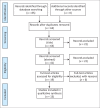In pursuit of increasing the application of tele-audiology in South Africa: COVID-19 puts on the alert for patient site facilitator training
- PMID: 35924605
- PMCID: PMC9350208
- DOI: 10.4102/sajcd.v69i2.900
In pursuit of increasing the application of tele-audiology in South Africa: COVID-19 puts on the alert for patient site facilitator training
Abstract
Background: The coronavirus disease 2019 (COVID-19) presented and highlighted new and unanticipated challenges to the provision of clinical services, raising an urgency for the application of different models of service delivery, including tele-audiology. In many tele-audiology encounters, a site facilitator is needed at the patient site to help with the hands-on aspects of procedures, and the implications of this requirement are significant for the resource-constrained African context.
Objectives: The aim of this scoping review was to investigate published evidence on training provided to patient site facilitators (PSFs) for tele-audiology application to guide the South African audiology community in tele-audiology application initiatives.
Method: Electronic bibliographic databases including Science Direct, PubMed, Scopus MEDLINE and ProQuest were searched to identify peer-reviewed publications, published in English, between 2017 and 2021 related to training of PSFs. The guidelines of the Preferred Reporting Items for Systematic Reviews and Meta-Analysis (PRISMA) were followed during the screening process as well as for illustrating the process.
Results: Findings are discussed under four key themes: (1) type of tele-audiology and the implications thereof, (2) length of training and its implications, (3) diversity in the range of PSFs used and its implications for the training, and (4) heterogeneity in the training.
Conclusion: The findings highlight important considerations for tele-audiology application within the African context, specifically decision-making around who can serve in the role of PSFs, as well as content and nature of training required, with implications for policy and regulations as well as human resource strategy. These findings are important for the COVID-19 pandemic era and beyond.
Keywords: COVID-19; South Africa; audiology; human resources; patient site facilitators; tele-audiology; training.
Conflict of interest statement
The author declares that she has no financial or personal relationships that may have inappropriately influenced her in writing this article.
Figures
Similar articles
-
South African hearing conservation programmes in the context of tele-audiology: A scoping review.S Afr J Commun Disord. 2020 Mar 3;67(2):e1-e10. doi: 10.4102/sajcd.v67i2.670. S Afr J Commun Disord. 2020. PMID: 32129657 Free PMC article.
-
Implementation factors influencing the sustained provision of tele-audiology services: insights from a combined methodology of scoping review and qualitative semistructured interviews.BMJ Open. 2023 Oct 23;13(10):e075430. doi: 10.1136/bmjopen-2023-075430. BMJ Open. 2023. PMID: 37875289 Free PMC article.
-
Conducting clinical research in the era of the COVID-19 pandemic: Challenges and lessons for Speech-Language Pathology and Audiology research.S Afr J Commun Disord. 2022 Jul 18;69(2):e1-e14. doi: 10.4102/sajcd.v69i2.898. S Afr J Commun Disord. 2022. PMID: 35924604 Free PMC article. Review.
-
The use of tele-audiology in ototoxicity monitoring: A scoping review.J Telemed Telecare. 2024 Apr;30(3):475-496. doi: 10.1177/1357633X211068277. Epub 2022 Jan 6. J Telemed Telecare. 2024. PMID: 34989631
-
Simulations as a mode of clinical training in healthcare professions: A scoping review to guide planning in speech-language pathology and audiology during the COVID-19 pandemic and beyond.S Afr J Commun Disord. 2022 Aug 2;69(2):e1-e13. doi: 10.4102/sajcd.v69i2.905. S Afr J Commun Disord. 2022. PMID: 36073069 Free PMC article.
Cited by
-
The impact of COVID-19 on speech-language and hearing professions in low- and middle-income countries: Challenges and opportunities explored.S Afr J Commun Disord. 2022 Sep 9;69(2):e1-e15. doi: 10.4102/sajcd.v69i2.937. S Afr J Commun Disord. 2022. PMID: 36226974 Free PMC article.
-
Original Research Clinical attendance rate at a tertiary adult audiological service in South Africa.S Afr J Commun Disord. 2023 Nov 14;70(1):e1-e9. doi: 10.4102/sajcd.v70i1.967. S Afr J Commun Disord. 2023. PMID: 38044862 Free PMC article.
-
Evaluating the feasibility of a tele-diagnostic auditory brainstem response service in a rural context.S Afr J Commun Disord. 2024 Jul 31;71(1):e1-e9. doi: 10.4102/sajcd.v71i1.1020. S Afr J Commun Disord. 2024. PMID: 39099283 Free PMC article.
References
-
- Arksey, H., & O’Malley, L. (2005). Scoping studies: Towards a methodological framework. International Journal of Social Research Methodology: Theory and Practice, 8(1), 19–32. 10.1080/1364557032000119616 - DOI
-
- Bennett, R.J., Swanepoel, D.W., Manchaiah, V.I.N.A.Y.A., & Eikelboom, R.H. (2020). Tele-audiology services in Australia: A shift in clinical practices. AudiologyNOW, 81, 11–13.
-
- Christopher, N., Edward, T., Sabrina, B.K., & Agnes, N. (2013). The prevalence of hearing impairment in the 6 months – 5 years HIV/AIDS-positive patients attending paediatric infectious disease clinic at Mulago Hospital. International Journal of Pediatric Otorhinolaryngology, 77(2), 262–265. 10.1016/j.ijporl.2012.11.013 - DOI - PubMed
Publication types
MeSH terms
LinkOut - more resources
Full Text Sources
Medical

